
To support NGOs in this role, the Alliance developed the Accountability Toolkit (Toolkit), a structured framework that provides a practical roadmap to help NGOs assess local gaps and define country-specific advocacy strategies to hold governments to account in implementing Priority Interventions such as 30 km/h zones. Between 2023 and 2025, seven NGOs used the Toolkit through the Alliance Incubator Program to advocate for the implementation of 30 km/h zones in their countries. The Alliance Incubator mobilizes and strengthens NGOs’ advocacy to drive implementation of interventions that have been proven to be effective in reducing the road-related deaths and injuries that occur globally each year. Along the way, they achieved various outcomes and learned what works when driving change through accountability.
Discover the results and lessons learned from their advocacy work, including government commitments, legislation, and the implementation of new 30 km/h zones. Learn how their advocacy work helped strengthen collaboration between NGOs and government authorities in many countries, and how focusing on key demands and using pilot projects makes advocacy more targeted and acceptable.
Below is practical guidance, advocacy tips, and insights for NGOs, policymakers, and partners seeking to build safer and more equitable streets. Together with the accompanying case study “Making 30 km/h a reality: a case study of advocacy work in Kenya and Uganda using the accountability toolkit,” it connects local experiences to the Global Plan for the Decade of Action for Road Safety (Global Plan) goal of halving road deaths and injuries by 2030, demonstrating that with structured advocacy, collaboration, and persistence, real change is possible.
7 NGOs using the Toolkit to support advocacy
Promotion: Tunisia (implementation of 30 km/h zones in municipalities in Tunis Governate promoted through FIA Foundation online news); Uganda (new law) promoted in UBC national television and Kampala Capital City Authority website)
Implementation: Kenya (review of the Traffic Act in progress).
Commitment: Argentina (verbally from the Tres de Febrero municipality to implement a 30 km/h zone in Villa Bosch); Chile (in a newspaper by the Municipality of Valparaíso to make improvements in Cerro Las Cañas; Nepal (in an MOU between Tokha municipality and SAN Nepal to develop a five-year strategic plan that will include implementation of 30 km/h zones); Tanzania (verbally from TARURA to implement 30 km/h zones in Kinondoni district, Dar es Salaam)
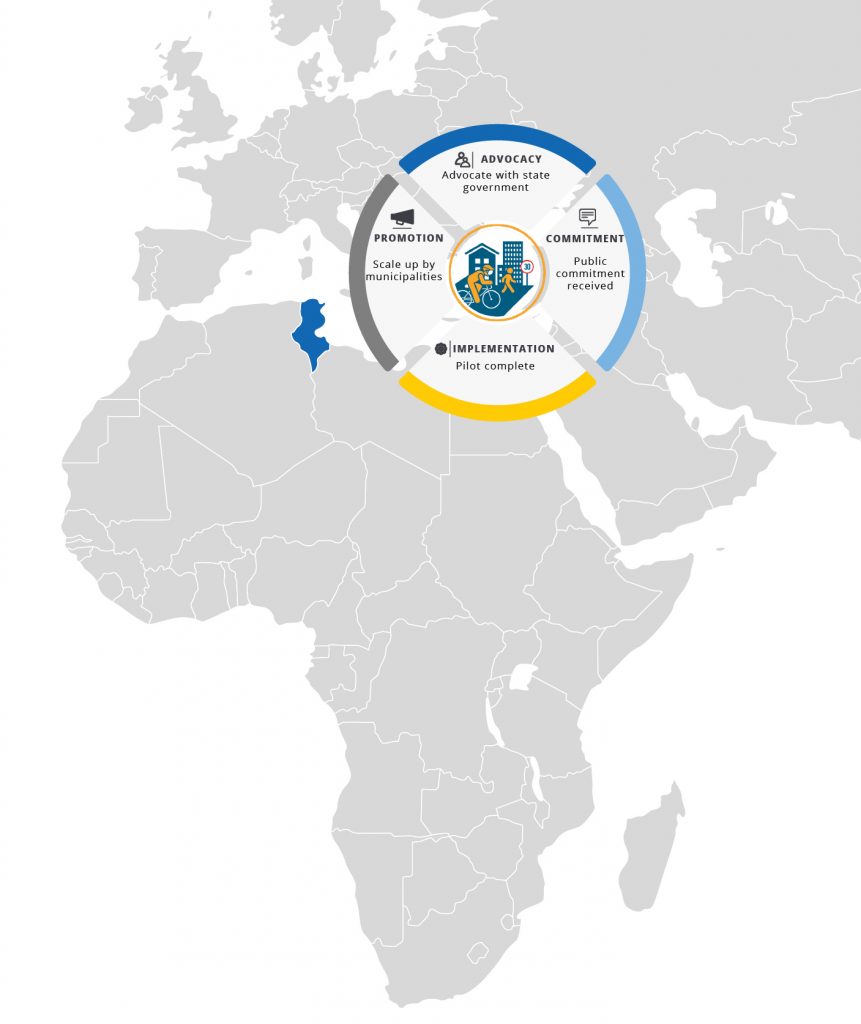
Promotion: Following the amendment of the Decree No.151 of 2000 in 2023, which mandates speed reduction in educational zones, ASR has continued its advocacy for implementation of this Decree. Carthage municipality implemented a 30 km/h zone around a school at Byrsa in June 2025 and Tunis and Sidi Hassine municipalities have allocated budgets to integrate 30 km/h zones in urban mobility plans. The implementation of 30 km/h zones by municipal governments is being promoted (e.g through FIA Foundation online news) for wider scale implementation across Tunisia.
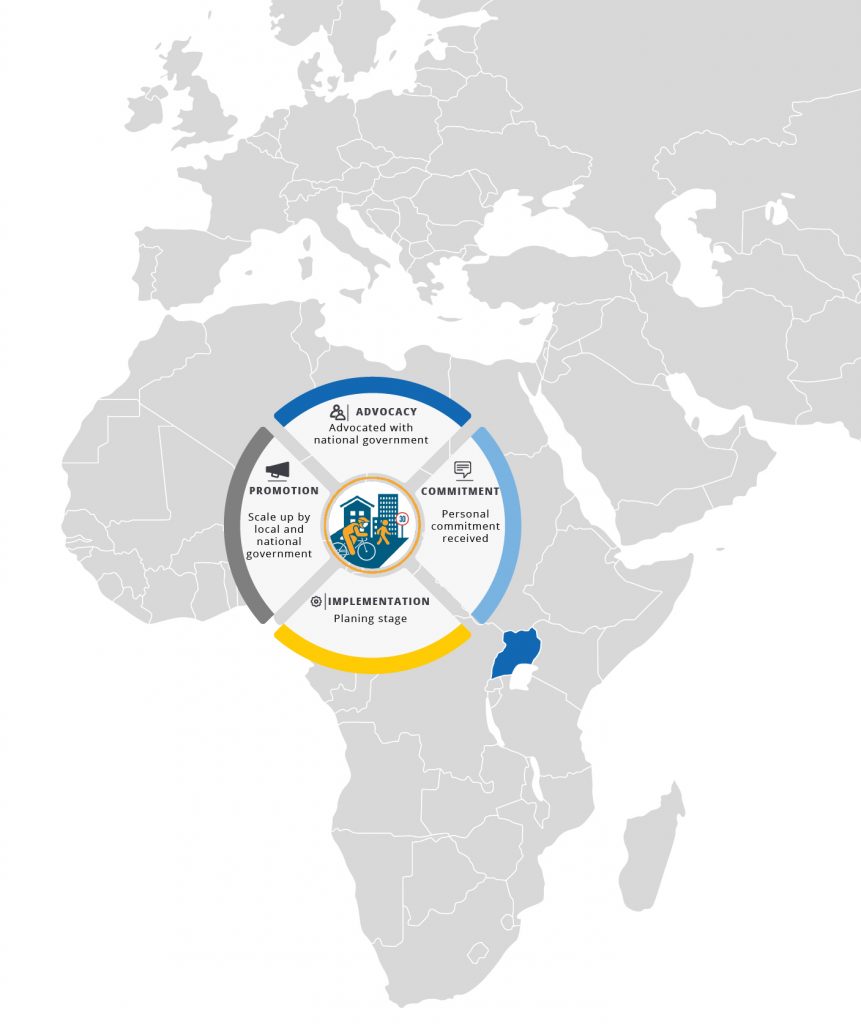
Promotion: URRENO’s key ask to the Ugandan government to implement a new law to lower speed limits from 50 km/h to 30 km/h in urban centers and high pedestrian zones has resulted in Gazette Vol.28 of 4 April 2025, which imposes a maximum speed of 30 km/h in high-risk areas such as schools, hospitals, markets and business centers. A busy City Square junction is one example that benefited from this speed reduction. This new regulation has been widely promoted via UBC national television and Kampala Capital City Authority website to support government implementation of the new default 30 km/h speed limits.
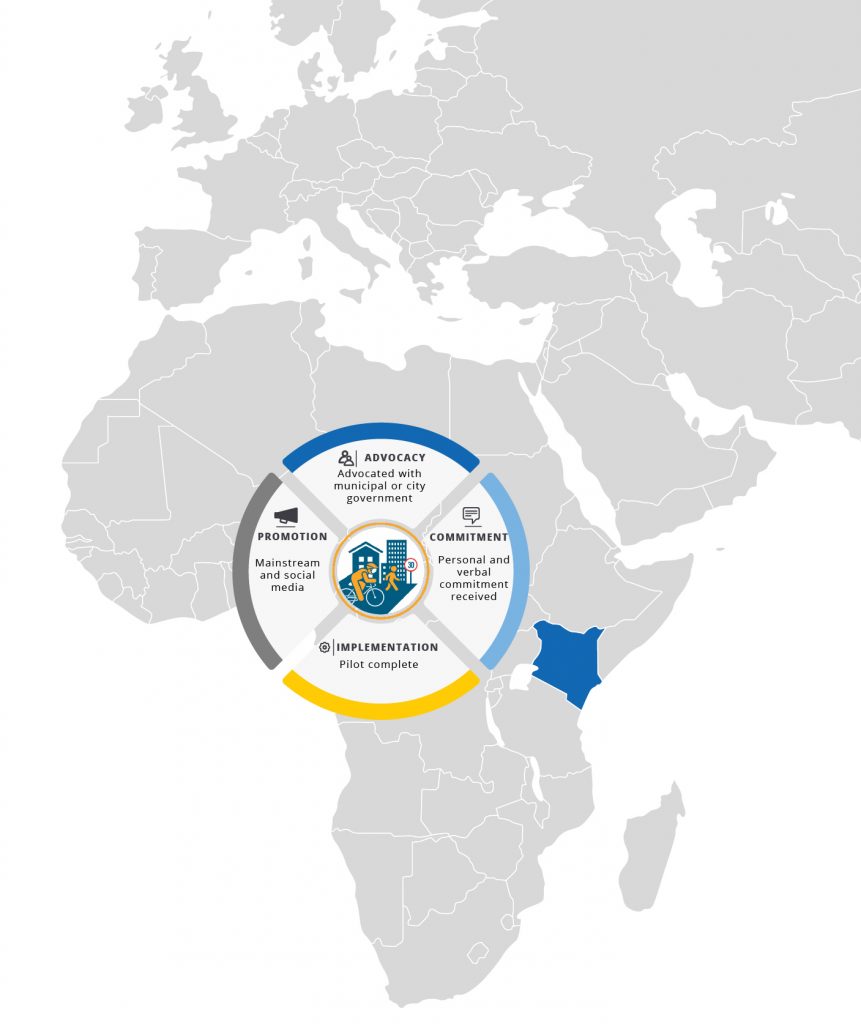
Implementation: ASIRT Kenya’s key ask to the government for the inclusion of 30 km/h zones in the review of Kenya’s Traffic Act is in the implementation stage. A bill is being drafted to enable new 30 km/h zones especially in urban areas or near schools. A 30 km/h zone on Kayole one Road at Kayole one Primary School, Nairobi was launched in October 2024 in partnership with AMEND, Automobile Association of Kenya and ASIRT Kenya with funding from FIA Foundation (New Road Safety Initiative Brings Relief for Kayole Schoolchildren). During the MEET stage, ASIRT Kenya strategically promoted this implementation to advocate for the review of the Traffic Act which can enable scaled implementation of 30 km/h zones nationwide beyond one off implementation.
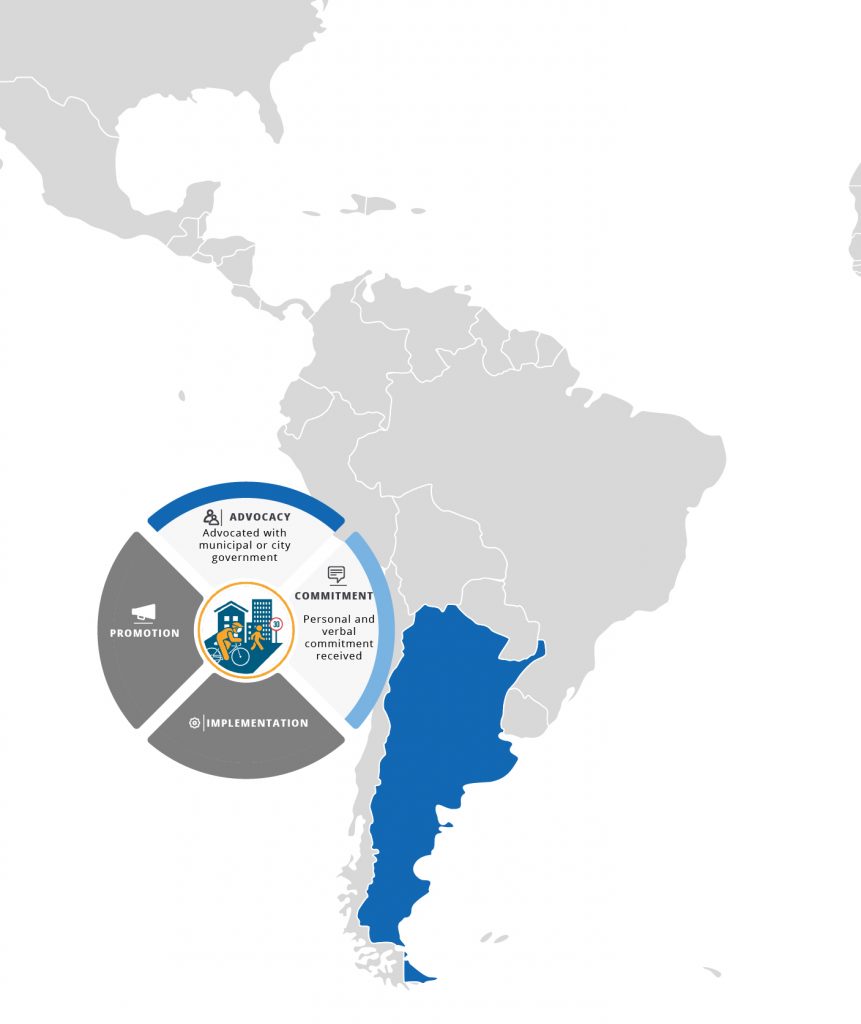
Commitment: MiNU used the NGO Talking Points, highlighting international recommendations and practical low-cost measures to influence the municipal technical team in Tres de Febrero. Despite a new political context and reduced budgets, MiNU has obtained a verbal commitment from the Tres de Febrero municipality to implement a 30 km/h zone in Villa Bosch during a Roundtable meeting.
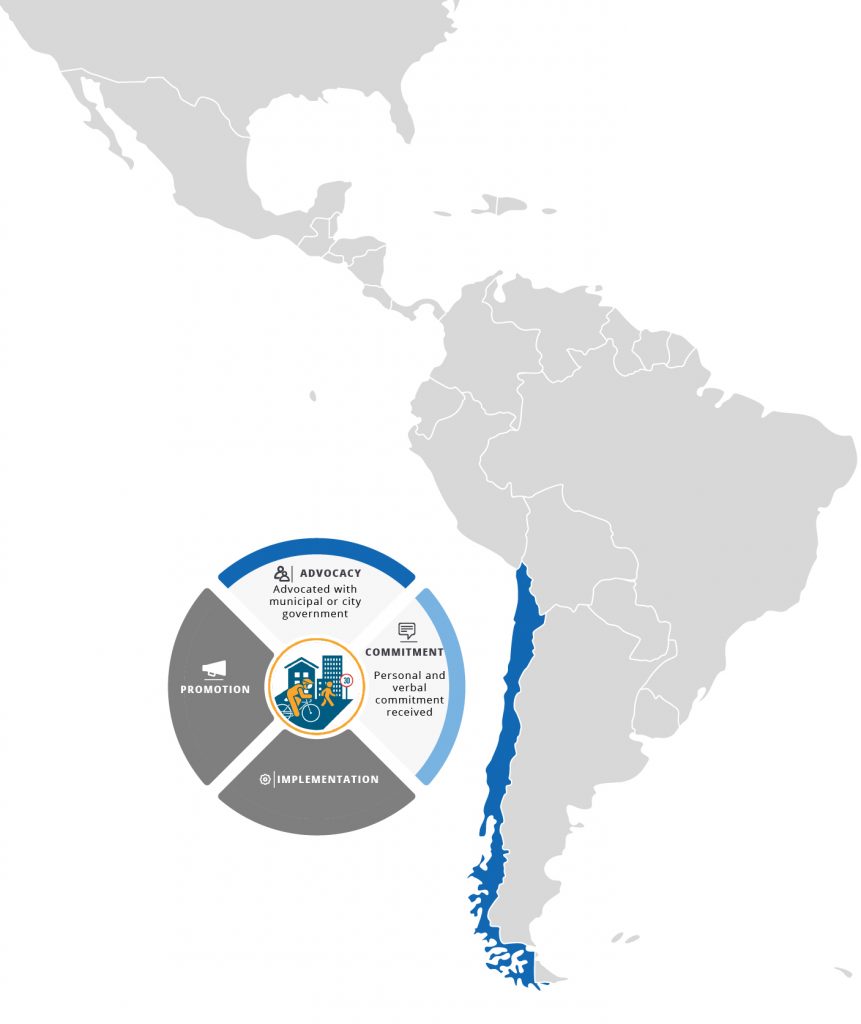
Commitment: Fundación Emilia presented their key ask to integrate 30 km/h limits into urban mobility plans to the municipalities in Santiago Metropolitan. The Municipality of Valparaíso has made a public commitment to make improvements in Cerro Las Cañas, Calle 262 Demóstenes. Recoleta municipality and Lo Espejo municipality each shared blueprints developed in 2023 by the Transit Directorates of the Municipalities in collaboration with the Regional Government of Santiago and validated by the Regional Secretary of Transport of Santiago (SEREMI) to carry out improvement works, including repainting of 30 km/h signages at Liceo Arturo Pérez Canto and Escuela Raúl Sáez E-570 respectively.
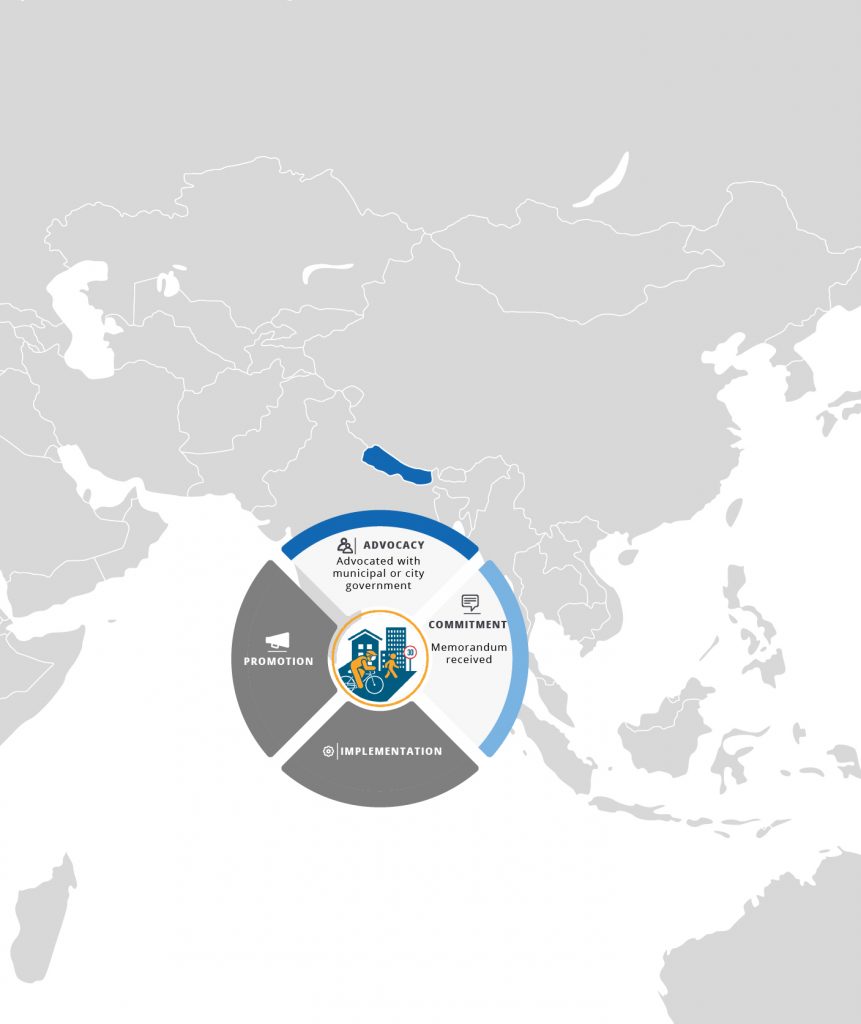
Commitment: The Tokha municipality signed a Memorandum of Understanding with SAN Nepal in a roundtable, committing to develop a five-year strategic plan that will include implementation of 30 km/h zones and has hired a consultant to draft the strategic plan. This expert will work closely with municipal officials, SAN Nepal, and local communities to develop actionable policies and implementation timelines.
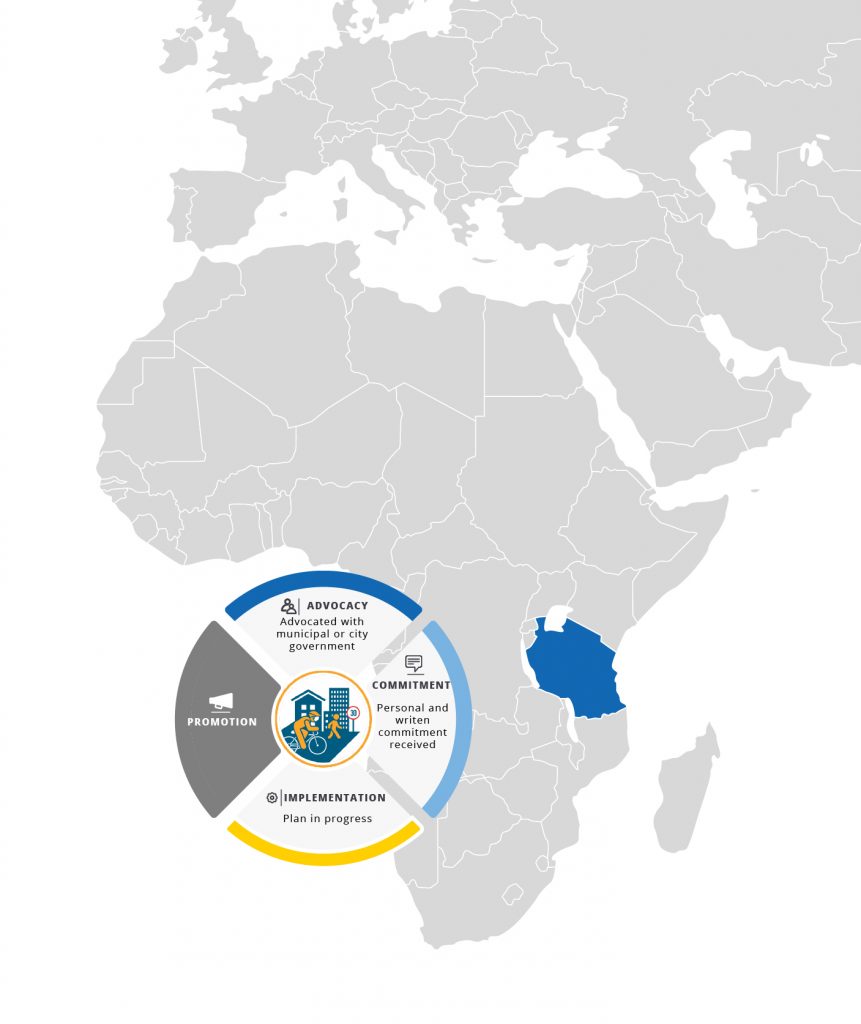
Commitment: RSA Tanzania presented their proposed implementation of a 30 km/h zone in the area of Ally Hassan Mwinyi School, Kinondoni District, Dar es Salaam Region to the Tanzania Rural and Urban Roads Agency (TARURA). In a roundtable meeting, TARURA made a verbal commitment to implement 30 km/h zones in Kinondoni district, Dar es Salaam, and has designated a technical team to work closely with RSA to implement a 30 km/h zone as soon as a budget is allocated.
The Toolkit provides a clear structure and systematic approach to real-world advocacy.
“The Toolkit provided a clear, structured approach, which helped us break down a complex process into manageable steps.” — ASR, Tunisia
“The Accountability Tracker provided a systematic way … to document each communication or meeting with government officials and track their responses to ensure follow-up on commitments made.” — SAN Nepal
The Toolkit serves as a local diagnostic tool to identify gaps/aopportunities/hooks, translating broad intentions into specific, achievable goals.
“The Checklist is very resourceful. It went into detail and delved into the deep areas to help us assess the situation, identify existing policies, and provide concrete information to support our advocacy. First, it was the “discovery” of the government documents that mentioned 30 km zones during the assessment phase. This included the National Action Plan draft (now launched) and the Government’s road safety mainstreaming document.” – ASIRT Kenya
“The structured, step-by-step approach shifted us from reactive advocacy to a more strategic and coordinated approach grounded in local diagnostics and tied to national processes” — Fundación Emilia, Chile.
The Toolkit helps NGOs to build the case for evidence-based interventions and connect advocacy key asks to existing government initiatives, making it easier to gain government support.
“The Toolkit enabled analysis, which was crucial in presenting the findings in a more compelling and actionable way and community-friendly outputs, strengthening our credibility with government actors and gaining responses from municipalities (e.g. Recoleta and Valparaíso).” — Fundación Emilia Chile

Concrete NGO asks and inputs help to move advocacy forward.

Levels of government interest vary, and pilots can make 30 km/h more attractive.

Being clear about contextual stumbling blocks that are stalling progress helps to identify tailored advocacy strategies.